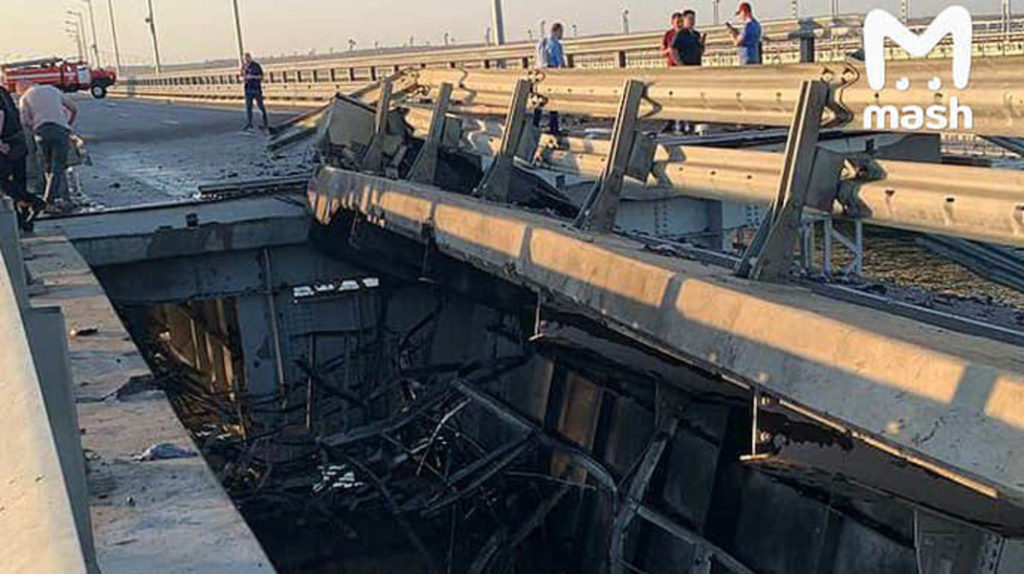On the night of July 17th, sounds of explosions were heard in Kerch, and reports of damage to a section of the Kerch Bridge started to emerge. The Russian occupying authorities in Crimea, represented by Sergey Aksyonov, stated that there was an «extraordinary event» near the 145th support of the Kerch Bridge from the side of Krasnodar Krai, and traffic on the bridge was halted. The Investigative Committee of Russia launched a criminal case under the charge of «terrorism.» The Russian National Anti-Terrorism Committee claimed that the bridge was attacked by two unmanned surface vehicles. Both agencies accused Ukraine of the attack. On the same day, Russian President Putin called the explosion at the Crimean Bridge «another act of terror» and a «senseless crime,» stating that the bridge was allegedly not used for military transportation and promised a «response from Russia.» In response, the Russian Ministry of Defense announced on July 19th that from July 20th, all vessels sailing in the Black Sea near Ukrainian ports would be considered potential carriers of military cargo.
It’s worth noting that on July 17th, the day of the explosion at the Kerch Bridge, the «Black Sea Grain Initiative» was set to expire. Ukraine, Russia, Turkey, and the UN had extended the agreement in May. In recent weeks, Russia actively pushed its position that it did not plan to renew the agreement. A few hours after the explosion, Putin’s press secretary, Dmitry Peskov, announced Russia’s withdrawal from the «grain agreement.» However, he also stated that Russia could return to the agreement if «all arrangements concerning Russia are fulfilled.»
In response, the Ukrainian side, represented by Natalia Humeniuk, the head of the press center of the Southern Operational Command of the Ukrainian Armed Forces, stated on July 17th that the damage to the Kerch Bridge might be a Russian scenario implemented before the extension of the «grain agreement.»
The development of the mentioned scenario, as well as the promised «response» from Putin, did not take long. For three consecutive nights, the Russian aggressor has been carrying out targeted and massive combined strikes on the port infrastructure of the Odessa region, using dozens of missiles of various types and kamikaze drones. It is important to note that such large-scale combined attacks require extensive planning, both operationally and technically, and the involvement of naval and aerospace forces by Russia during the strikes. This indicates that it was a pre-planned action, and the incident at the Kerch Bridge was just a pretext. As a result of these Russian attacks, the grain infrastructure of international and Ukrainian traders and carriers has suffered significantly. In the port of «Chernomorsk» in the Odessa region, 60 thousand tons of grain destined for China were destroyed in the night of July 19th due to the Russian shelling.
Russia is demonstrating that it does not provide security guarantees for the «grain corridor» and, primarily, for Ukrainian ports. This is why the main targets of Russian attacks were the ports of Odessa and Chernomorsk, where Ukrainian and international grain terminals and sunflower oil terminals are located. This is an attempt by Russia to pressure the UN and Turkey to agree to Russian terms for extending the «grain deal.» This is further supported by Putin’s statement on July 19th: «We are not against the agreement itself. And we will consider the possibility of returning to it, but on one condition — if all principles of Russia’s participation in the agreement are fully taken into account and, most importantly, implemented.» Among the conditions mentioned by Putin are lifting sanctions on Russian grain and fertilizer exports «to the world markets,» connecting banks to SWIFT, and ending «all restrictions.»
The massive shelling of the port infrastructure in the Odessa region also indicates that Russia’s plans regarding the prospects of Ukrainian agro-export are more aggressive. Russia will not be satisfied with merely staying out of the «grain deal» but intends to destroy any possibility for Ukraine to export its products by sea, thereby ruining the corresponding port infrastructure.
Commenting on the massive shelling of the port infrastructure on July 19th, Ukrainian President Zelensky stated: «Russian terrorists deliberately targeted the infrastructure of the ‘grain deal,’ and each Russian missile is a strike not only against Ukraine but also against everyone in the world seeking a normal and safe life.»
The High Representative of the EU, Josep Borrell, stated on July 20th in Brussels before the meeting of the EU Council of Foreign Ministers that the continuous targeted shelling of port infrastructure in Odessa by Russia for the third consecutive night will lead to a global food crisis. As evidence of his statement, Bloomberg reported that on July 19th, wheat futures on the Chicago Exchange jumped by 9%, marking the most significant daily increase since 2012. On the morning of July 20th, the price rose by another 1%. Thus, with its recent aggressive actions and statements, Russia is fueling global food inflation.

